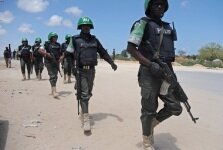Sanaa, Yemen (CNN)In just a few weeks, good relations with neighbors have become a matter of survival for Yemen’s President Abdu Rabu Mansour Hadi.
On Saturday, he joined his allies in Egypt, while battles raged on in his country.
After Houthi rebels occupied the capital Sanaa weeks ago, his government fled. When Hadi called for military intervention to beat back their attempt to overthrow him, adjacent countries answered with a grand airstrike operation.
In the darkness of early Saturday, their jets increased the hail of ordnance on Sanaa, as Saudi led operation al-Hazm Storm went into its third day. And Hadi waited in Sharm el-Sheikh, Egypt to meet with the region’s leaders at the Arab League summit.
‘Scariest night’
This past “night was by far the scariest night since the raids started,” said journalist Hakim Almasmari in Sanaa. “The strikes were so strong and continuous.”
The jets bombarded Hadi’s weapons caches and other military assets, Houthi and Yemeni government officials said.
Saudi Arabia has blockaded the Houthis, effectively cutting off their supply lines, and its air force controls Yemeni airspace. Saudi Arabia and Egypt have spoken about the possibility of putting boots on the ground.
The Arab League is expected to give its official blessing to al-Hazm Storm on Saturday, which could clear the way for a ground invasion, CNN’s Becky Anderson reported.
But a few member nations, such as Shiite majority Iraq or possibly Algeria, could give military action a thumbs down.
Sunni-Shiite divide
Though the Saudi kingdom has taken the lead with some 100 warplanes, the coalition partners include the United Arab Emirates, Kuwait, Bahrain, Qatar, Jordan, Morocco, Sudan and Egypt.
Together they comprise about a third of the Arab League’s membership. They are majority Sunni Muslim nations, and the Houthi rebels are Shiite Muslims allied with Iran.
Having Yemen become an Iranian satellite country on its border would be perceived as a major threat by neighboring Saudi Arabia, which sees the Houthis as proxies of Tehran, Saudi Arabia’s bitter rival on the Persian Gulf.
Iran has sharply denounced the armed intervention.
The United States, on the other hand, strongly approves of it and is supporting it logistically, and aiding coalition forces in locating targets, but it is not participating in active battle.
A small contingency of U.S. forces had been stationed in Yemen to help in the fight against Al Qaeda in the Arabian Peninsula, but left once Houthi rebels took the capital.
HRW: Civilians killed
Dozens of people have died in the strikes, and on Saturday, Human Rights Watch said many of the victims were civilians, perhaps as many as 34.
“Reports of air strikes and anti-aircraft weapons in heavily populated areas raise serious concerns that not enough is being done to ensure their safety,” HRW regional spokesman Joe Stork said.
A Saudi Arabia defense official blamed civilian deaths on the Houthis, saying they were using them as human shields. Brig. Gen. Ahmed bin Hasan Asiri said the kingdom’s military was using precision weapons to avoid collateral damage, state-run Saudi News Agency reported.
Media outlets have come under fire as well. An hour after Hadi ordered the closure of all Houthi-controlled media — including Yemen TV and Saba TV — Houthis raided two TV channels and the prominent Al Masdar newspaper.
Al Jazeera’s office in Sanaa was also targeted, the Qatar-based network said, with Houthis looting security cameras and damaging equipment.






